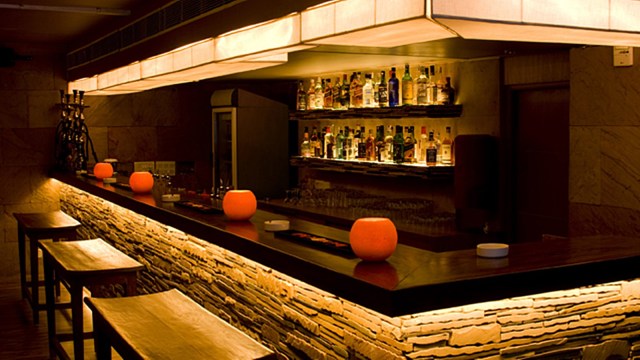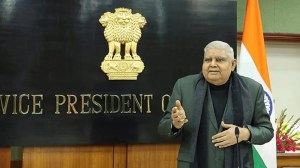Click here to join Express Pune WhatsApp channel and get a curated list of our stories
Pune Porsche car crash: Students say liquor easily available, restobar owners tighten policy
On the need for stringent policies, president of The Indian Hotel and Restaurant Association Sukesh S Shetty said regulations already exist but in this case, they had not been adhered to.
 The petitioner claimed that whenever authorised outlets for sale of liquor are shut, illegal businesses thrive. (Representational/ File)
The petitioner claimed that whenever authorised outlets for sale of liquor are shut, illegal businesses thrive. (Representational/ File)At Pune’s buzzing restaurant hubs, the mood is sombre. Karan Khilnani is the co-owner of Elephant and Co and Cobbler and Crew, both located near the accident spot where a 17-and-a half year old boy crashed his Porsche into a two-wheeler in Kalyani Nagar, killing two people.
Given that the minor boy was driving his car in an inebriated condition, after making stops at two bars on the fateful night, it has compelled restaurant and pub owners to make their policies stricter.
“We and our teams are still absorbing it (the incident), considering it happened on the same route that our team members take every night,” says Khilnani. At his resto bars, he says, individuals below the age of 21 are not permitted after 7pm unless accompanied by their parents. Additionally, strict measures are in place to ensure that those aged between 21 and 25 are served only wine and beer.
Khilnani has now implemented a new policy. Individuals aged between 21 and 25 will be given identification bands upon entry. If anyone at a table falls within this age bracket, the entire table will only be served beer and wine.
“We won’t even be serving them sangria or other cocktails containing hard liquor,” he says. He emphasised the importance of rigorous checks, both at the entrance and at the table, accepting only hard copy or soft copy identification from platforms like DigiLocker as valid proof of age. “We want to avoid any potential lapses,” he adds.
On the need for stringent policies, president of The Indian Hotel & Restaurant Association (AHAR) Sukesh S Shetty said regulations already exist but in this case, they had not been adhered to.
“There is a legal drinking age that every bar has to adhere to. Here bars have defaulted,” he said. “A total of 19,200 liquor licences have been issued in the whole of Maharashtra. How many of them are pubs or high-end places? Hardly one or two per cent of them. These incidents happen at high-end places that have a lot of customers coming in,” he elaborated.
Prior to ruling on the police’s remand application in Pune’s drink-driving incident, Additional Sessions Judge S P Ponkshe had observed on Tuesday: “What will the people on the streets do? Because those coming to big pubs will not go home walking. They will drive their vehicles. Something needs to change in this situation. Aren’t you aware how much alcohol is served to customers? Decide a limit for it.”
 Porsche that was involved in the crash that killed two persons and the bike that the deceased were riding at Yerwada Police Station premises on Monday morning. Express Photo by Pavan Khengre
Porsche that was involved in the crash that killed two persons and the bike that the deceased were riding at Yerwada Police Station premises on Monday morning. Express Photo by Pavan Khengre
Responding to queries about imposing limitations on drinking, Shetty underscored the practical challenges. “There’s a wishlist and then there is a practical aspect to it. While what happened is very unfortunate, we can’t keep on adding new laws. Otherwise, the book would become so heavy that we won’t be able to oblige and it would lead to further corruption,” he articulated, revealing that AHAR is gearing up for a campaign against driving post-drinking.
On contacting BIRA 91 Taproom, which has presence in Delhi, Gurugram or Bengaluru, they responded, “We serve over a million guests every year, and follow state-wise regulations on legal drinking age through ID checks.”
Even though most restaurants officially have a strict policy against serving liquor to minors, a 20-year-old college student in Mumbai shared that it is not that difficult to drink alcohol even if you are barely 18.
“Alcohol is easily available at dive bars in South Mumbai. Other places used to be lenient before the G20 Summit, but have become stricter since. Mitron will allow you entry but might not serve liquor if they suspect you are a minor,” she said adding that some clubs take bookings for college freshers’ or farewell parties, where liquor is served to all the students, none of whom are of the permissible age limit.
Students told The Indian Express that promoters run WhatsApp groups where they send invitations to clubs. One student showed us a message from a promoter which read, “I have my guestline in 20+ clubs in Mumbai on a daily basis.” His message further stated that students could contact him for reservations even if they hadn’t received his message. “Couples and girls are free on my guestlist,” the message read. Sanmit Amin, sales and marketing head for Peninsula Hospitality, confirmed that Mitron does work with promoters to attract crowds.
“Most of our promoters are 24-years-old or above. However, sometimes we do get younger promoters or their sub-promoters, who bring in younger crowds. In that case, we stop working with them,” says Amin. He added all properties of Peninsula Hospitality, including Mitron and Opa, implement a double security check.
“On weekdays, there is a security team checking ID cards at the entrance, followed by the floor manager asking for ID proof if he becomes suspicious. On weekends, we also have our PR team running a second layer of security,” he shared, noting that the biggest challenge is youngsters using fake ID cards.
“Our team can usually recognize them, but sometimes they are very well done. In such cases, we also ask for a second ID card,” he added. When asked about college parties, Amin said that they only accept party requests from postgraduate students. “We only cater to those above 24 and 25,” he added.
Rakshay Dhariwal, managing director of Pass Code Hospitality, the company behind PCO in Delhi and Mumbai, said bars have to ensure they aren’t facilitating underage drinking because kids aren’t mature enough to handle liquor. He further added that while bars mustn’t serve underage individuals at all, they should be cautious even with adults.
“We must stop serving guests when we notice they are incapacitated. Additionally, we should check if they have a driver, a friend driving them, or if they have neither, then call a cab for them,” noted Dhariwal, adding that they have this policy at PCO.
Agrees Ashesh L Sajnani has two restaurants serving alcohol in Chembur — Via Bombay and Le Café. “The other day, we saw a young couple celebrating their anniversary and when we noticed that they had had too many drinks, we stopped serving them, and offered them cold water with lemon. They were upset initially but soon sense prevailed, they had their meal and left,” he said adding that they also encourage their guests to leave their car behind and take a cab if they are drunk, promising that the valet would bring their car to their home next morning.
Sajnani also pointed out that there needs to be an onus on parents, who are allowing children as young as 14 or 15 to have beer. “A lot of money is given to children these days. Considering most of the transactions are now happening digitally, parents should at least keep a tab on where the money is going,” he added.
Liquor policies across the globe
The drinking age varies from state to state in India, oscillating between 18 to 25 years. Minimum drinking age limit in states like Goa, Sikkim, Rajasthan, Union Territories of Andaman and Nicobar and Puducherry is 18; it is 25 in states such as Delhi, Haryana, Punjab and Chandigarh. For Maharashtra, it is 21 for beer and wine and 25 for hard liquor. There are also parts of the country, such as Bihar and Gujarat, where it is completely prohibited.
Internationally, the minimum drinking age limit is between 18 and 21 with the UK allowing individuals aged 16 or 17 to consume beer, wine, or cider with a meal in a restaurant when accompanied by an adult.
The laws are stringent when it comes to driving under the influence (called DUI laws). In the US, the blood alcohol concentration (BAC) limit for driving is 0.08% for drivers aged 21 and over, and 0.02% for those under 21 — it means 80 mg of alcohol per 100 ml of blood for those above 21 and 20 mg of alcohol per 100 ml of blood for those under 21. In the UK, it is 0.08% in England, Wales, and Northern Ireland, and 0.05% in Scotland. In India, the BAC limit for driving is 0.03%.
When it comes to penalties, a standard first offence is almost always considered a misdemeanour in the US but if a DUI offender kills or seriously injures another person, he or she is looking at felony charges. In the UK, the penalty could be life imprisonment, an unlimited fine and/or a ban from driving for at least five years. In India, it includes fines, imprisonment, and licence suspension.
The road ahead
India’s drinking culture is undergoing a metamorphosis where not only is the demand for alcohol increasing, supplemented by a growth of homegrown brands, but also the interest in cocktails. This trend is leading to a culture where bartenders, akin to chefs, are becoming more experimental, travelling internationally, and gaining recognition, both domestically with platforms like 30 Best Bars and internationally with Asia’s 50 Best. While this brings onus on the bars and liquor importers to promote safe drinking behaviour, there is also a need to have conversations at home to destigmatise drinking.
Click here to join Express Pune WhatsApp channel and get a curated list of our stories












